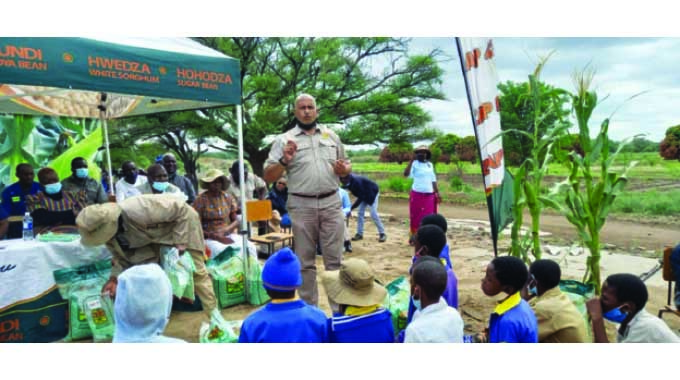Irrigation development: ARDA gets down to business
The Herald
30/11/2021

Thupeyo Muleya Beitbridge Bureau
The Agricultural and Rural Development Authority (ARDA) has started deploying business development managers to most community irrigation schemes countrywide to boost production and enhance rural industrialisation.
ARDA chairman, Mr Ivan Craig, said the move was part of the state enterprise’s operationalisation of Statutory Instrument 38 of 2021.
Among other things, the legal instrument makes it mandatory for irrigation-based projects to operate as business entities, in line with the National Development Strategy 1 (NDS1), which identifies agriculture as one of the major economic drivers.
So far ARDA has deployed 26 business development managers to work with community members in improving operations and realising the much-needed returns that push sustainable economic growth and address food security.
He was speaking during a tour of the Jalukange irrigation scheme in Beitbridge’s Ward 8, last week, which is part of the nine irrigation projects, Government, and other development agencies are rehabilitating.
“One of our mandates as ARDA is to manage 450 irrigation schemes in the country, with a total of 10 500 hectares, excluding the new schemes, and we are looking at surpassing that target.
“So, our business model includes deploying business development managers at each irrigation scheme and we are capacitating them, working hand in hand with the Department of Agriculture Extension Services (Agritex).
“Additionally, we have to come in with a plan for the irrigation scheme, which starts with rehabilitation, efficient water use, this can be drip or the use of centre pivots, and in some instances, we have to do away with the wasteful flood irrigation models”.
ARDA is also working hand in glove with Agriculture Marketing Authority (AMA) and Zimtrade to identify the markets for the crops.
This is done to avoid having different crops on a scheme that is not economically viable.
Instead, they are using a block system of having a uniform crop on a scheme because it helps the farmers negotiate discounted prices on inputs and helps on marketing their produce.
“The idea is to make each irrigation scheme a centre of excellence. This is a setup where we are going to be producing whatever product, and the people around the scheme will also be able to come for training on modern farming schemes,” said Mr Craig.
He said it was critical to create business farmers and shift from the business as usual attitude.
The business development managers, at the irrigations projects, are helping with training on production and creation of business models for the communal farmers.
“They need to know how to make money, budget, and go back to the field. By so doing, we want everybody to benefit. The uptake on the ground is encouraging, and on the 26 irrigation schemes we have, we have deployed our business development managers who are working hand in hand with Agritex and there is good progress there,” said Mr Craig.
Beitbridge District Development Coordinator, Mrs Sikhangazile Mafu-Moyo said the model had proved to be effective considering the rate at which production was peaking at some irrigation projects.
District Agronomist, Ms Eve Kuza said more women were taking up space at the rehabilitated projects, a scenario good enough to improve their livelihood at the household level.
“You will note that most of these projects are now using green energy (solar) and doing continuous soil testing, which will see them producing throughout the year and be able to improve their income levels, that what they have been doing focusing on one season,” she added.
